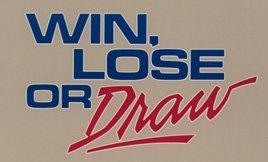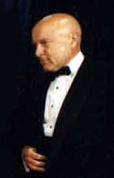Related Research Articles

The Price Is Right is an American television game show where contestants compete by guessing the prices of merchandise to win cash and prizes. A 1972 revival by Mark Goodson and Bill Todman of their 1956–1965 show of the same name, the new version added many distinctive gameplay elements. Contestants are selected from the studio audience: the announcer calls their name, asking that they "Come on down!", the show's famous catchphrase.

Family Feud is an American television game show created by Mark Goodson. Two families compete on each episode to name the most popular answers to survey questions in order to win cash and prizes.

Card Sharks is an American television game show. It was created by Chester Feldman for Mark Goodson-Bill Todman Productions. Contestants attempt to predict the outcome of survey questions to gain control of a row of oversized playing cards, then determine whether the next card drawn is higher or lower. The title Card Sharks is a play on the term "card sharp", a person skilled at card games.

Name That Tune is an American television music game show. Originally created and produced by orchestra conductor Harry Salter and his wife Roberta Semple Salter, the series features contestants competing to correctly identify songs being played by an on-stage orchestra or band.

Lingo is an American television game show with multiple international adaptations. Contestants compete to decode five-letter words given the first letter, similarly to Jotto, with each correctly guessed word earning number draws to attempt filling in a Bingo card.

Win, Lose or Draw is an American television game show that aired from 1987 to 1990 in syndication and on NBC. It was taped at CBS Television City, often in Studios 31, 33, and 43 at various times. It was co-produced by Burt & Bert Productions and Kline & Friends for Disney's Buena Vista Television. It has also had two versions on The Disney Channel: Teen Win, Lose or Draw from 1989 to 1992, and a revived version known as Disney's Win, Lose or Draw which aired in 2014. New York described Win, Lose or Draw as "a knockoff" of the board game Pictionary, however, Burt Reynolds and Ed McMahon referred to playing the game at Burt's home during the August 2, 1978 episode of The Tonight Show, with Johnny Carson, three years before Pictionary was created.

Jackpot is an American and Canadian television game show produced by Bob Stewart which saw contestants attempting to solve riddles in order to win cash and prizes.

Body Language is an American game show produced by Mark Goodson Productions. The show aired on CBS from June 4, 1984, until January 3, 1986, and was hosted by Tom Kennedy. Johnny Olson announced until his death in October 1985; Gene Wood and Bob Hilton shared the announcing duties afterward, having substituted on occasion before then.
Liar's Club is an American game show, originally produced by Ralph Andrews, featuring a panel of celebrity guests who offered explanations of obscure or unusual objects. Contestants attempted to determine which explanation was correct in order to win prizes.

Tic-Tac-Dough is an American television game show based on the paper-and-pencil game of tic-tac-toe. Contestants answer trivia questions to put up their respective symbol, X or O, on a tic-tac-toe board. Three versions were produced: the initial 1956–59 run on NBC, a 1978–86 run initially on CBS and then in syndication, and a syndicated run in 1990. The show was produced by Barry & Enright Productions. However, the rights to the format are controlled by NBCUniversal.
Yahtzee is an American game show that premiered on January 11, 1988. Based on the dice game Yahtzee, the show was hosted by Peter Marshall, with Larry Hovis serving as both the show's announcer and a regular panelist. Each week featured a different hostess serving as "dice girl", including Kelly Grant, Denise DiRenzo, and Teresa Ganzel.

You Don't Say! is an American television game show that had three separate runs on television. The first version aired on NBC daytime from April 1, 1963, to September 26, 1969, with revivals on ABC in 1975 and in syndication from 1978 to 1979. The last two incarnations were executive produced by Ralph Andrews and produced and directed by Bill Carruthers.
The New Price Is Right was a syndicated edition of the American game show The Price Is Right which premiered on September 12, 1994, and ran until January 27, 1995. This was the third thirty-minute syndicated edition, following a weekly series that ran from 1972 until 1980 and a daily series that ran for one season between 1985 and 1986.

Frederick Albert Travalena III was an American entertainer, specializing in comedy and impressions.

Ralph Herrick Andrews was an American television producer best known for producing the 1960s game show You Don't Say!, the 1970s game show Celebrity Sweepstakes, and the original 1987 version of Lingo.

Password Plus and Super Password are American TV game shows that aired separately between 1979 and 1989. Both shows were revivals of Password, which originally ran from 1961 to 1975 in various incarnations. With only subtle differences between them, both Password Plus and Super Password retained the format of play as their predecessor, with two teams of two people each—a celebrity and a contestant—attempting to guess a mystery word using only one-word clues. A new feature included a series of five passwords as clues to an overarching puzzle for the teams to solve.
Stewart Television was an American game show production company formed by Bob Stewart in 1964 originally based in New York City.

Wheel of Fortune is an American television game show created by Merv Griffin. The show has aired continuously since January 6, 1975. Contestants solve word puzzles, similar to those in hangman, to win cash and prizes determined by spinning a giant carnival wheel. The current version of the series, which airs in nightly syndication, premiered on September 19, 1983.
Jeopardy! is an American television game show created by Merv Griffin. The show is a quiz competition that reverses the traditional question-and-answer format of many quiz shows. Rather than being given questions, contestants are instead given general knowledge clues in the form of answers and they must identify the person, place, thing, or idea that the clue describes, phrasing each response in the form of a question.

Celebrity Name Game is an American syndicated game show that premiered on September 22, 2014. Based on the board game Identity Crisis, the series was developed by Courteney Cox and David Arquette's Coquette Productions and was originally pitched as a primetime series for CBS with Craig Ferguson as host. The series was later picked up by FremantleMedia and Debmar-Mercury as a syndicated series for 2014 with Ferguson, who left The Late Late Show on December 19, 2014, remaining as host as well as an executive producer. The series marks Coquette's first foray into game shows. The show was subsequently renewed for a second season, which premiered on September 21, 2015.
References
- ↑ "Ralph Andrews Productions, Inc. V. Paramount Pictures Corp. (1990)".
- ↑ "Ralph Andrews Productions, Inc. V. Paramount Pictures Corp. (1990)".
- ↑ "The who, what, where, and when of syndication this fall", Broadcasting Magazine, September 3, 1984
- ↑ "Ralph Andrews Productions, Inc. V. Paramount Pictures Corp. (1990)".
- ↑ "Anything for money". easkme. easkme. Retrieved 25 February 2019.
- ↑ "Ralph Andrews Productions, Inc. V. Paramount Pictures Corp. (1990)".
- ↑ Article about the British version (courtesy of ukgameshows.com)
- ↑ de Castro, Thell (9 December 2018). "Ostentação de Silvio Santos entrou na mira do Banco Central; saiba por quê". Notícias da TV (in Brazilian Portuguese). Archived from the original on 20 August 2024. Retrieved 19 August 2024.
- ↑ Duarte, Marcelo (5 January 2024). "Opinião – O Curioso: Relembre os quadros mais famosos de pegadinhas na televisão brasileira". Folha de S.Paulo (in Brazilian Portuguese). Archived from the original on 13 June 2024. Retrieved 19 August 2024.